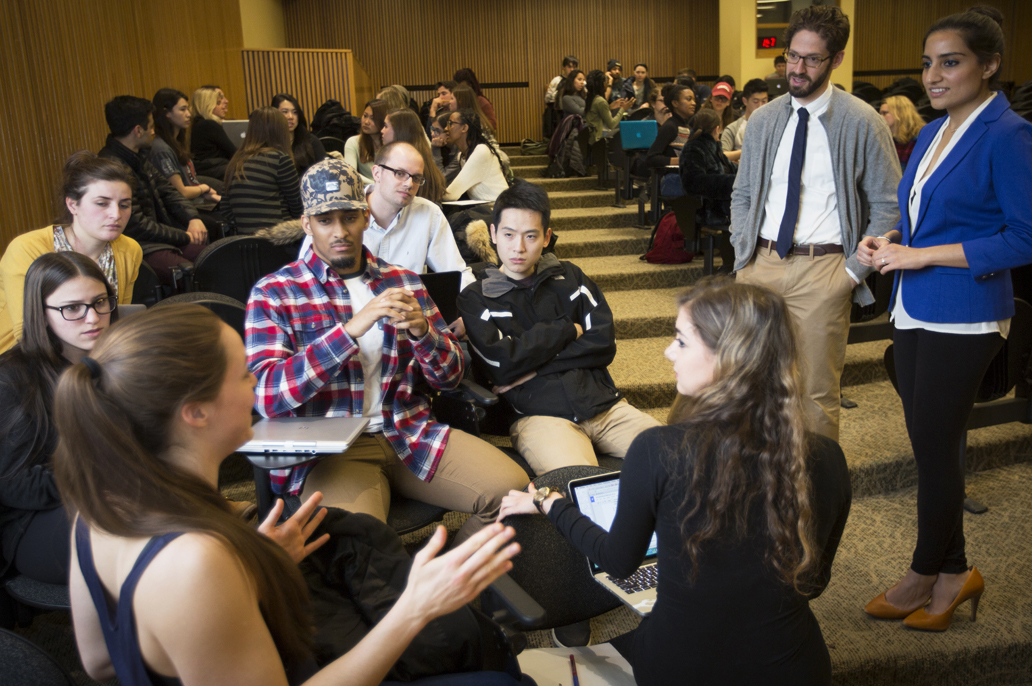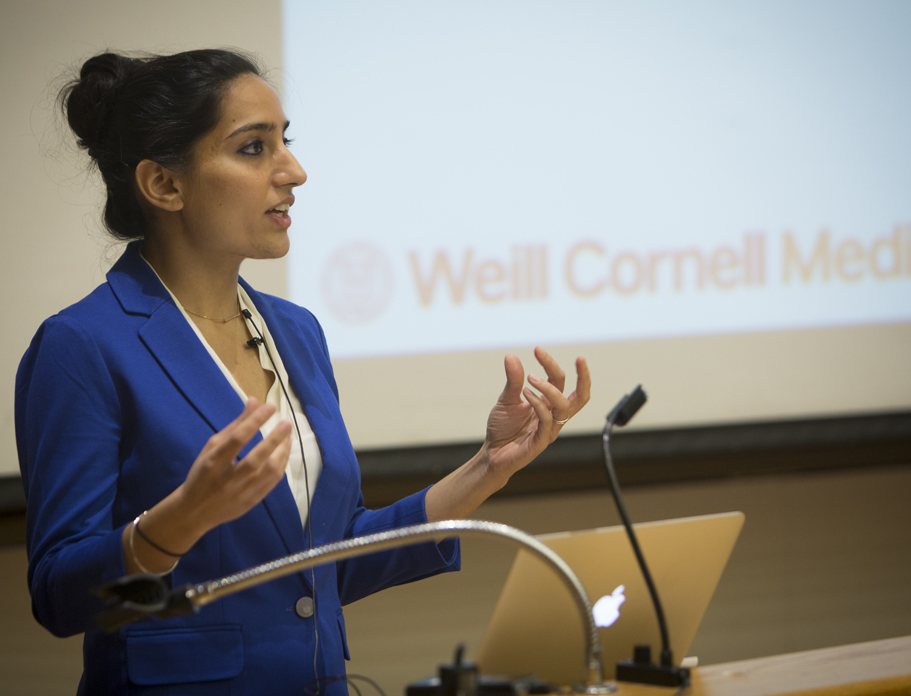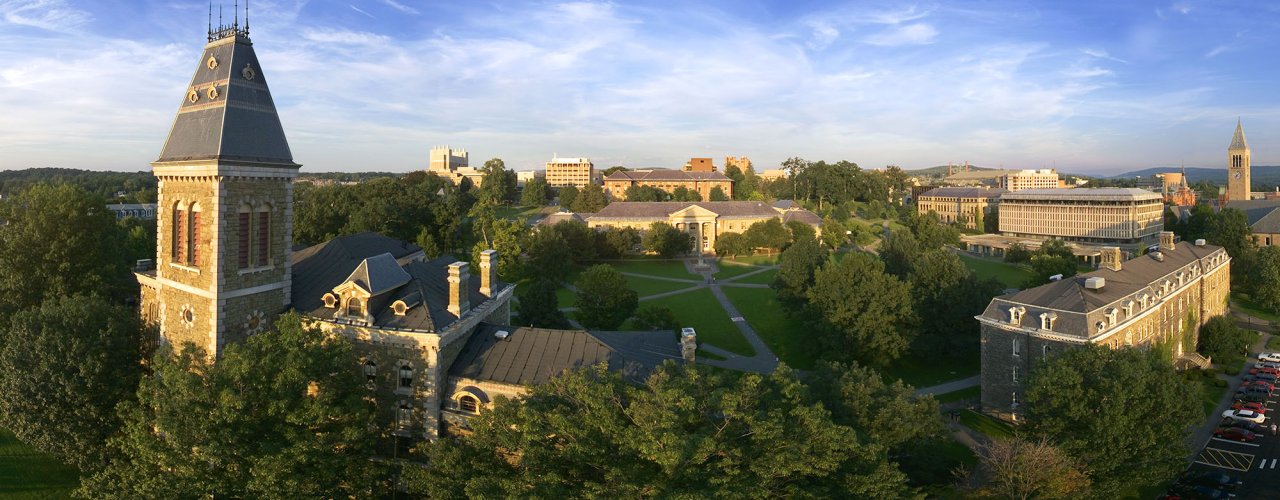Connections Across One Cornell

“We’re not just looking at epidemiology or pathophysiology but also at economics and politics—and how combining these different disciplines gives you a much richer understanding of why health and healthcare are the way they are in a particular part of the world ...”
Global Health Case Studies
If there’s one thing Weill Cornell Medicine anesthesiologists Eric Brumberger ’01 and Gunisha Kaur ’06, MD ’10 want students to see in their Global Health Case Studies course, it’s connections: those between social and economic factors and health, medical interventions abroad and unintended consequences—and connections between Cornell’s Ithaca campus and its medical campus in New York City.
Motivated by their own undergraduate experiences—as a student Kaur felt the medical school was “far away, making it hard to interact with”—the course co-founders have drawn on Internationalizing the Cornell Curriculum grant support from the Office of the Vice Provost for International Affairs and Mario Einaudi Center for International Studies to develop a unique undergraduate course whose impact spans both campuses.
Since its inception in the spring of 2016 as a 7-week series of seminars, Global Health Case Studies from Weill Cornell Medical College (NS 3090)—offered in Ithaca through the Division of Nutritional Sciences, thanks to professor Zhenglong Gu and his early and enthusiastic backing for the concept—has grown quickly. Granted permanent approval a year ago, the course now covers the full fall semester and every week features different Weill Cornell Medicine faculty members from a variety of clinical subspecialties, including surgery, psychiatry, emergency medicine, and pediatrics.
The case studies course is meant to enhance existing offerings in global health by linking insights into the biosocial approach to practitioners’ real-life experiences and career paths.
“The syllabus is pretty broad,” Kaur says. “We’re not just looking at epidemiology or pathophysiology but also at economics and politics—and how combining these different disciplines gives you a much richer understanding of why health and healthcare are the way they are in a particular part of the world, whether it’s the United States or abroad.”
The case studies course is meant to enhance existing offerings in global health by linking insights into this biosocial approach to practitioners’ real-life experiences and career paths, thereby showing students—roughly two-thirds of them are pre-meds—a diversity of possible pathways for their own futures in the field.
For Nicole Calautti ’17, one of the course’s first teaching assistants, a lecture on the unintended consequences of global health initiatives made a particularly strong impression.
“All these years later I still remember Dr. Kaur speaking about the introduction of ultrasound in resource-poor areas in India,” she says. “The intention was to improve the quality of medical care, but because in these communities it is more socially and economically advantageous to have a son, women’s ability to know the sex of their fetuses may increase the rate of female feticides. This really drove home the importance of considering the culture and values of a population when introducing a new technology or practice.”

Like half a dozen other students, Calautti used the direct contacts to clinicians offered by the course to build her own bridge to Weill Cornell Medicine. After graduating from Cornell with a major in human biology, health, and society and a minor in human development, she took a gap year as a full-time research assistant in the Department of Anesthesiology, working on a variety of projects in global health, including a study by Kaur investigating chronic pain in torture survivors seeking asylum in the United States.
“The lessons I learned in the course and while working at Weill Cornell Medicine are now at the forefront of my mind whenever I see patients—and will help me to better serve people from a variety of social contexts throughout my career,” says Calautti, currently a first-year student at the University of Virginia School of Medicine.
Constructive feedback from students such as Calautti has allowed Brumberger and Kaur to steadily improve the course by making numerous changes to its structure and design. After the first semester, for example, they significantly reduced the amount of required reading.
“We and all of our faculty are used to teaching medical students and beyond, which is a different paradigm,” Brumberger says.
The course founders turned to Cornell’s Center for Teaching Innovation for advice. Workshops, video conferences, and individual feedback sessions have helped them and their colleagues to adjust their expectations to a level appropriate for undergraduates and expand their repertoire of teaching skills—with unintended benefits for their medical students.

“I love knowing that I’m getting exposed to leading-edge educational techniques encompassing content creation, style, and pacing of seminars, as well as progressive use of technology and media,” Brumberger says. “It informs the way I teach and give lectures at Weill Cornell Medicine, and because I sit at a leadership and development position for our anesthesiology residency program, I think the exposure to these curricular innovations will trickle into to my graduate medical education program for years to come.”
Back in Ithaca, students have rewarded the course founders’ hard work with glowing reviews and effusive thank you emails.
“I don’t think it’s because it’s the best course on campus,” Kaur notes, “but I think undergrads are craving and thirsty for that connection to Weill Cornell Medicine.”
Calautti, for one, is satisfied. “Before taking the course, I thought of the two campuses as quite distinct and separate,” she says, “but courses like NS 3090 emphasize that Cornell is one university that just happens to span across the state. More than that, this course highlighted Cornell’s presence around the globe.”
By Olivia Hall for Global Cornell

